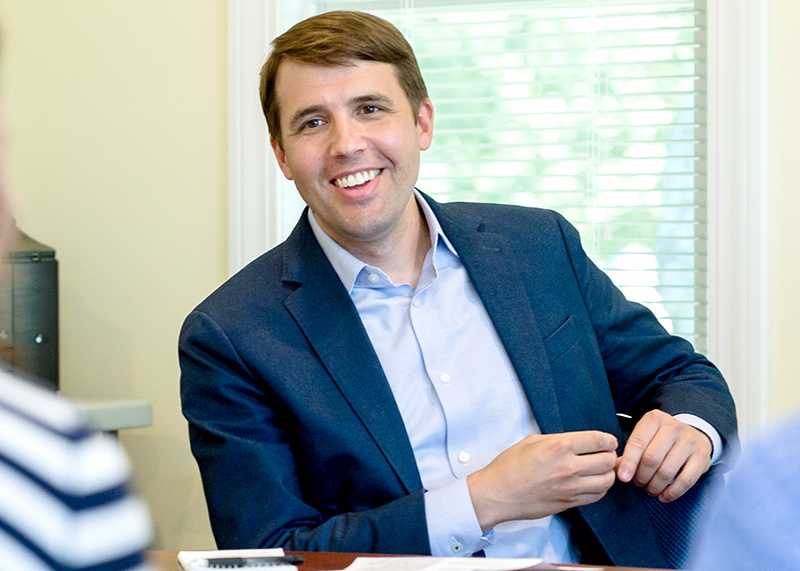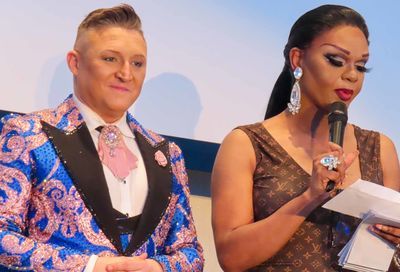Republican AIDS Czar Scott Evertz
The MW Interview
That Scott Evertz is an openly gay man with a job in a Republican administration isn’t the most surprising thing. The most surprising thing is that his job still exists.
Although it sounds like yet another in a long list of bureaucratic way stations, the White House Office of National AIDS Policy (ONAP) was a controversial creation back in the early days of President Bill Clinton. After some rocky beginnings — the first of the so-called AIDS czars fell quickly to controversy from both the left and right — the office didn’t settle into normalcy until Clinton’s second term, when former director Sandy Thurman brought stability to the office during her three-and-a-half years at the helm.
With George W. Bush’s presidential victory, conventional wisdom in the AIDS community was that the AIDS czar and ONAP would fade away as Republicans implemented their own policies and priorities. Hence the surprise when Bush decided to keep the high-profile office open, and named the first gay AIDS czar as well.
Of course, maintaining an office isn’t the same as maintaining a commitment — a distinction not lost on Evertz. It’s a challenging position to be in. Many AIDS activists on the left are wary of the Republican approach to HIV/AIDS, and worry that the administration lacks the will to make the necessary commitments to fight the disease. Many social conservatives on the right have long waited for the opportunity to focus federal HIV prevention efforts on abstinence-only programs, and some have very publicly expressed their displeasure at the president’s appointment of an open homosexual.
When talking about the state of the epidemic both in the U.S. and internationally, Evertz sounds determined to find the middle ground between those two sides. And after less than one year in the job, he’s established himself as the AIDS czar, garnering favorable, if occasionally grudging, responses from both sides.
For a job that so many people expected to disappear, it’s not a bad way to start.
MW: What do you consider as your top priorities in this position?
Scott Evertz: One is addressing the challenge of getting more people into care and treatment with basically the same amount of money. As you probably know, the president’s budget has “flat-funded ” the Ryan White CARE Act. However, I would point out that mandatory spending on programs like Medicaid continues to go up — the United States government continues to support people living with HIV and AIDS at an unprecedented rate. Admittedly, we flat-funded the Ryan White program, so the challenge will be to get more people into care and treatment with fewer dollars. We are undergoing a review of how we spend out funds at Health and Human Services. That is separate and distinct from audits. The program review is the administration’s effort to seriously look at how we spend our money, because we assume that we could do a better job. I don’t think anyone objects to that statement. The audit — the bad “A ” word that people have referred to — refers to things such as the inspector general at HHS looking at the AIDS program in San Francisco. These are two separate and distinct things.
MW: Is the program review more of an accounting thing and reviewing of systems or is it looking at actual program content?
Evertz: Both. I don’t think anyone would disagree that we don’t have nearly enough answers to our questions. What kind of prevention works? How do we get people into care and treatment more quickly? The reason we’re taking a strong look at Medicaid reform is that we know if you get HIV positive people onto Medicaid and accessing [AIDS] drugs, that results in cost savings because we’re not waiting for people to get sick. There are things that we already know we could do that would be more efficient. We’ve been stuck with systems that oftentimes work to the disadvantage of people providing care as well as people living with HIV/AIDS.
MW: You’ve spoken a lot elsewhere about international efforts. What are your focuses in that arena?
Evertz: We’re proud that it’s taken less than a year to get the Global Fund for HIV/AIDS, Malaria and Tuberculosis up and running. We’ve been very involved because we have a vested interest in making sure this thing works. When you have the number of countries that have come together to create the fund it can be a mind-boggling task, but we’ve done it. We’ve always said that as the fund demonstrates success, the United States commitment to it will continue and increase, and we see that happening in the not-too-distant future.
I’d stress that the global fund does not equal the United States response to the international AIDS pandemic. Our efforts through organizations like USAID will continue. There’s a temptation to look at the total in the fund — it’s around two billion at this point — and compare that to the number the United Nations has said we need to spend, which is seven to ten billion, and conclude that we’re five billion short. That’s an apples and oranges comparison. You need to compare all the U.S. funds that are being spent on HIV/AIDS globally to the U.N.’s number.
MW: With the reaction to Secretary of State Colin Powell’s recent supportive comments on condoms and HIV prevention, there remains an apparent tension with the abstinence movements and prevention advocates in the U.S. How does that tension play out at the international level? How do we get a consistent prevention policy from the U.S. when we seem to be sort of torn about it ourselves?
Evertz: We are not going to impose a Western or United States model on countries in Africa or Asia where we fund projects. The global fund is not the United States fund, so while we’ll continue to have that tension here in the United States between those who would agree with Secretary Powell and those who have a different opinion on that issue, that tension won’t be imposed on the process of the fund. It’s just not going to happen. [HHS Secretary Tommy G.] Thompson has some strong opinions on this issue too — he just hasn’t been cornered by a young woman on MTV yet. We’re not going to set him up for that either.
[Powell’s appearance] certainly was a watershed event in this whole debate, and very helpful for me. As we deal with the traditional AIDS advocacy community, they have applauded Secretary Powell and it’s nice to occasionally be applauded by that community, which exists to consistently challenge an administration. They did it in the Clinton years too, so I’m not suggesting that we’re being singled out. But it’s occasionally nice to hear we’ve done a good thing from those groups. Obviously some of the pro-family organizations have a problem with what Secretary Powell said. They’ve made their opinions known and we’ve heard them.
MW: Do you think it’s a possible to put together effective prevention programs that would make those particular groups happy?
Evertz: I think so. Just as we’re not going to impose the United States’ opinions or policy tensions on the world, we have a strong belief in local municipalities choosing the kind of prevention they wish to engage in. There’s an increase in the president’s budget for abstinence education and there are a number of school districts and organizations throughout the country that have an interest in that area. I would hope that some of the conservative organizations would see a willingness on the part of the administration to fund those programs. Time will tell whether those programs are effective, and we’re going to hold abstinence programs to the same standard that we want to hold the more traditional prevention programs. I would argue that neither has been through the kind of rigorous analysis that is important to determine success.
MW: On the face of it, since at least the definition of abstinence is no sex until marriage, don’t abstinence programs cut out a wide swath of people at risk for HIV infection?
Evertz: I would agree with you. If you take the abstinence message and the marriage message and all of those things literally, you logically exclude a significant chunk of the population. What’s interesting is that there are abstinence advocates who recognize that that’s the case, two of whom serve on the Presidential Advisory Council on HIV/AIDS [PACHA]. I don’t want to mischaracterize their opinions, but for one there is an emphasis on one life partner — not that you have to wait till you get married but you wait till you find your one life partner. These are people with pretty strong conservative credentials that are saying this, who recognize it makes no sense to exclude a certain percentage of the population.
MW: Would advisory council co-chair Tom Coburn happen to be one of those people?
Evertz: He’s not one to which I just referred.
MW: What about Coburn specifically? What was your initial feeling about his being appointed to the council?
Evertz: Obviously, I was part of the discussion so I wasn’t surprised. Dr. Coburn showed significant leadership on the reauthorization of Ryan White CARE Act, so I’m excited that he may [focus on that] because we want more people to be served better through the CARE Act. There’s not a single AIDS service organization or community based organization that disagrees with that premise. I’ve read all the quotes and all the things Dr. Coburn has said that are supposedly anti-gay or ultra pro-abstinence. We have people on PACHA who have a variety of different opinions and we encourage that. It’s my understanding that the comments Dr. Coburn made around the Defense of Marriage Act, which seemed to be the most egregious as far as the gay and lesbian community is concerned, are comments that he didn’t retract but that he has softened in recent years, including in an address to the Log Cabin Republicans.
MW: Coburn and others like to talk about “the truth about condoms ” so I’ll ask you, do you consider condoms to be an effective mode of HIV prevention?
Evertz: Yes, and there is no doubt in that area. The difference between condomless sexual behavior and sexual behavior with condoms is clear and evident.
MW: Is there a risk that Coburn’s work around condoms, which focuses on condoms not stopping transmission of some STDs such as genital warts [human papilloma virus (HPV)], undermines the use of condoms to stop transmission of HIV?
Evertz: I don’t think we should minimalize that concern. That doesn’t suggest that I disagree — from a medical standpoint, Dr. Coburn is correct when he says there is an issue about the spread of HPV. But as you are pointing out, the criticism of that barrier method could have an impact on individuals’ use or lack thereof in another area. We need to look at whether statements like that have an effect on people who are engaging in high risk behavior because that would be a problem.
MW: Over the past few years there have been a number of pushes for redirection of prevention toward abstinence based or other programs. Coburn himself sponsored legislation that would have redirected massive amounts of funding to partner notification activities. What do you consider an effective prevention program?
Evertz: You’ve articulated a number of politically hot issues in your question. We’re working with our federal colleagues on what is the most effective way to do two things. First, get as many people into care as possible, so we’re looking at ways to beef up the administration’s support of National HIV Testing Day. That’s something that has been somewhat high profile in the past, and we’re going to work to make it very high profile.
Beyond that, we need to do a much better job with our HIV surveillance data. If we could even have just a snapshot of one moment of who’s living with HIV in this country right now, our work would be so much easier. To the extent that there are ways that we can do a better job with surveillance, we’re going to support those.
MW: Looking at name-based HIV surveillance and unique identifier HIV surveillance systems, do you lean one way or the other in support?
Evertz: Not particularly. I think both provide us with a lot of information that will give us a better snapshot of the epidemic in this country.
MW: How long do you think it will be before CARE Act funding is based on HIV cases as opposed to AIDS cases?
Evertz: I hope it’s really soon. I think it could be within a couple years.
MW: Do you think the current unique identifier systems are up to that kind of level?
Evertz: Not necessarily. There seems to be significant progress in this area and a commitment but I don’t know if they’re up to the job.
MW: What is your reaction to the Citizens Against Government Waste report on federal AIDS funding?
Evertz: Actually, there hasn’t been as much reaction to that as I thought there would have been. The report from Citizens Against Government Waste clearly could have become a rallying cry and perhaps that was the intention of the organizers, but I don’t feel like that’s happened. Speaking critically of the report which I’ve read, it feels anecdotal and illogical in places. I would be the first one to say we know that there’s waste out there. I just spent some time with folks from some pretty left-leaning AIDS advocacy organizations and they agreed that we need to ferret out waste. That report did not do the job that it could have. There are good points, but it’s not a document that I think is going to be used by many people as they work to deal with real waste in HIV/AIDS spending.
MW: Two things really strike me in this report. One is that talking about gay sexuality is fairly specifically equated with waste. The other one is about compensation for executive directors and such, which seems to be why some AIDS activists are involved.
Evertz: I have reactions to both but I’ll start with the second. People are not responding to that. The groups that really want that issue to get momentum should probably do focus groups and find out if people care that Pat Christen in San Francisco earns over two hundred thousand dollars. The sense that I get is that most people just ignore that. I don’t know what the reason is but they do. It does not get people are fired up.
The gay sexuality point that you make is a really good one. There are certain things [in some prevention programs] that would be provocative or would shock even most gay people. The fact is, any discussion about gay sexuality shocks the mainstream of America. I think that’s why there’s this idea that it equals waste — “They’re using government money to talk about what? ” In defense of the organizations that are fairly provocative, I go back to the point of local control. I don’t presume I know what is popular in the Castro right now. I wouldn’t know the slightest thing about communicating with gay youth, but I trust that there are organizations that do. I don’t equate spending money to talk to gay youth with waste.
MW: Considering how popular you are in the Family Research Council’s “Culture Facts ” newsletters, do you feel like you’re under a microscope?
Evertz: There are times when I say something and as soon as I say it I feel a zap, a kind of Pavlovian response. But it hasn’t stopped me. I’m here to do a certain job to the best of my ability and the president has trust in me that I will do that. I’m curious that some people are still stuck on my appointment, but it’s been almost a year so I think now people realize that I’m going to stay.
MW: It’s sort of conventional wisdom that political enemies in D.C. can be personal friends, and that people outside don’t realize that Ted Kennedy and Orrin Hatch are friends. Is that the case with you and any of the people who have publicly opposed you or your appointment?
Evertz: To some extent yes, there’s kind of the Orrin Hatch/Ted Kennedy thing going on. I can even comfortably say, “If I’m helping your direct mail fundraising, I understand that that’s part of the game. ” Although I think there are some people in this city who don’t want to get to know me because they might discover that they don’t dislike me. It’s easier to dislike a concept than a person. I say that with my ego fairly in check, but it’s clear that when people know gay people it’s a lot harder to dislike them.
Support Metro Weekly’s Journalism
These are challenging times for news organizations. And yet it’s crucial we stay active and provide vital resources and information to both our local readers and the world. So won’t you please take a moment and consider supporting Metro Weekly with a membership? For as little as $5 a month, you can help ensure Metro Weekly magazine and MetroWeekly.com remain free, viable resources as we provide the best, most diverse, culturally-resonant LGBTQ coverage in both the D.C. region and around the world. Memberships come with exclusive perks and discounts, your own personal digital delivery of each week’s magazine (and an archive), access to our Member's Lounge when it launches this fall, and exclusive members-only items like Metro Weekly Membership Mugs and Tote Bags! Check out all our membership levels here and please join us today!
























